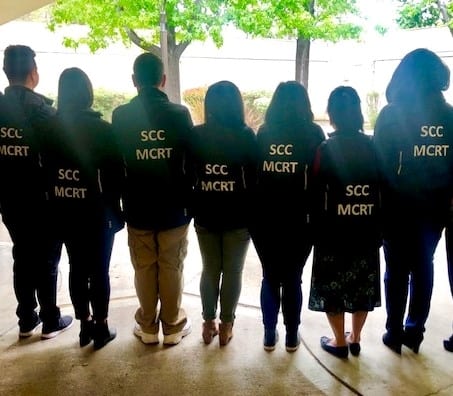As calls to defund the police in the wake of the killing of George Floyd sweep the nation, the focus has turned to how law enforcement handles calls related to mental health crises.
At its most basic level, “defund the police” is a demand for money to be moved from police budgets and reinvested into public welfare and social services. But in Santa Clara County, programs that could replace police response to mental health emergencies already exist and have been expanded over the years.
San Jose Independent Police Auditor Shivaun Nurre said the county’s Mobile Crisis Response Team is a “better resource” than police for mental health situations or homeless people in need of shelter during a recent discussion hosted by San José Spotlight.
“Instead of having officers handle our homeless population, you have people trained to handle their population,” Nurre said. “Officers aren’t social workers.”
The idea behind “defunding” police, supporters say, is to demilitarize law enforcement and refocus police resources for serious, violent crimes — rather than situations like mental health crises or homeless people in need of shelter.
Some politicians have tried to distance themselves from the idea as polling data suggests there is bipartisan support for reforms such as banning chokeholds and requiring all federal police officers to wear body cameras — rather than divesting police funding. Regardless of support, police officers today are tasked with responding to mental health crises in most cities.
Mayor Sam Liccardo has criticized demands to defund police, saying San Jose already has a thinly-staffed police force and is calling for reforms instead.
In 2019, 33% of San Jose Police Department subjects had mental health issues, according to a report on the department’s use-of-force. That percentage has risen steadily from 22% in 2015, the first year of the analysis.
The county’s Mobile Crisis Response Team (MCRT), which began in Jan. 2018, supports law enforcement agencies in dealing with mental health emergencies. The teams of clinicians help field calls from officers responding to 911 emergencies involving behavioral health issues and join officers on site.
In May 2019, the program expanded and is now available to residents through the Behavioral Health Services Department call center. There are now five two-person teams of licensed clinicians and therapists trained in crisis response and de-escalation to respond to calls 24 hours a day. For certain calls from residents, MCRT screens and assesses the situation over the phone and intervenes without law enforcement.
“They respond to situations that involve individuals in crisis that exhibit mental health symptoms, may be suicidal or at-risk, need resources or an evaluation for psychiatric hospitalization,” said county Behavioral Health Services Department spokesperson Joy Alexiou. “They intervene wherever the crisis is occurring — that means they go to the location of the crisis situation. This could be at a work site, school or home.”
MCRT has grown to a team of 15 since its launch, including seven clinicians and two law enforcement liaisons, who facilitate crisis intervention training for law enforcement officers. The team has provided services to more than 1,700 callers since its launch and made hundreds of field responses including “talking clients down from ledges, assisting in hostage situations and working with clients who have barricaded themselves in dangerous situations,” officials said.
From February to May of this year, MCRT responded to more than 700 calls, provided services to 239 people and made 173 field visits, according to data provided by Alexiou.
Mental health and behavioral health services are funded by Santa Clara County’s general fund.
The Behavioral Health Services Department received $561.1 million in 2019-2020, a 7.3% increase from the prior fiscal year. Funding for the Behavioral Health Services Department is a combination of County general fund, Mental Health Services Act funding, and state grants, according to Alexiou. The department includes services for substance use and suicide prevention and supportive housing. The most recent report on the county’s Mental Health Plan shows that in 2015, more than 18,000 people from low-income or vulnerable populations received these services.
By contrast, the county sheriff’s office received of $194.4 million for 2019-2020, up 5% from the prior year. In the year 2019 there were roughly 475 initiated calls for WI 5150 Mental Health Evaluation and 2410 initiated calls for Well Checks, according to the sheriff’s office, though upon further investigation on each event, calls can be dispositioned with a different code section by the investigating Deputy.
Contact Stella Lorence at [email protected] or follow @slorence3 on Twitter.



Leave a Reply
You must be logged in to post a comment.